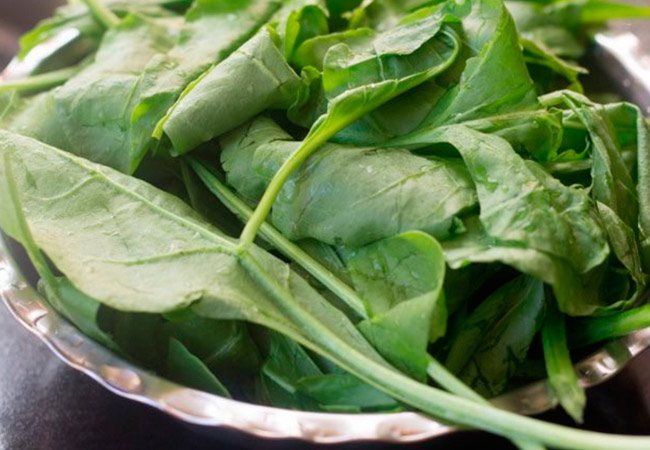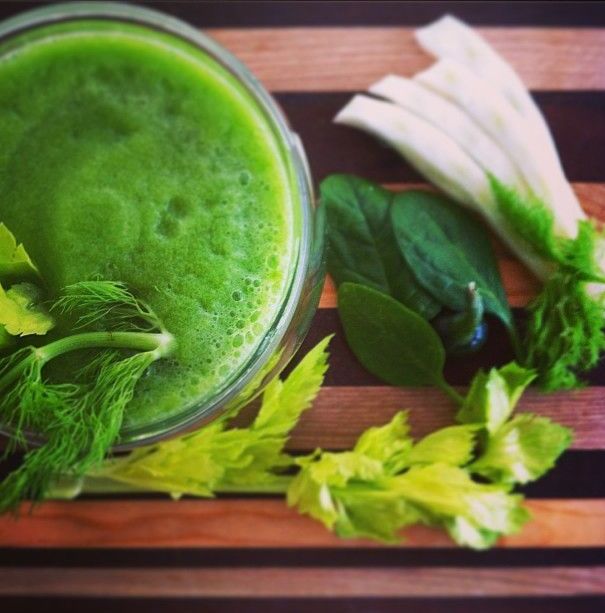The benefits of spinach
The need to eat spinach is due to the wide range of beneficial properties of greens:
- Improves the functioning of the intestinal tract and has a mild cleansing effect. Since spinach stimulates the gastrointestinal tract, it is not recommended to consume it in the first month of a baby’s life.
- It has an immunomodulatory effect, strengthens the body, and promotes its recovery.
- Relieves fatigue and stress.
- Stimulates brain function.
- Normalizes the activity of the nervous system.
- Strengthens bone tissue.
- Improves the condition of hair and skin.
To benefit the body, you need to consume only young spinach greens, which contain the maximum amount of vitamins and minerals.
It is important to remember the contraindications. People suffering from kidney and liver diseases should avoid including greens in their diet.
Spinach while breastfeeding
Is it possible to eat spinach during lactation? Since greens stimulate the functioning of the digestive tract, it is recommended to include them in the diet in the second month after childbirth. This should be done gradually, carefully observing the response of the baby’s body. If your child develops a rash, redness or other allergic signs, you should refrain from culinary experiments.
If taking spinach does not cause negative consequences, in the third month after birth you can increase the amount of greens consumed to 300 grams per day. You can eat it either fresh or after heat treatment. Regular inclusion of greens in the diet will help strengthen the baby’s body and restore the mother’s health.
Are you breastfeeding and worried about your nutrition? Make it a habit to eat tasty, fresh, and healthy foods. Spinach during breastfeeding is a very useful and necessary product for the full development of an adult body. It contains many useful substances:
- Cellulose;
- Vitamins of group A, B, C, E;
- Magnesium;
- Zinc;
- Phosphorus;
- A nicotinic acid;
- Minerals.
You eat, and the baby, through breast milk, receives all these components necessary for its timely development. Greens are needed in the diet, because they nourish and restore health after childbirth, and also help to lose weight, which is often the dream of mothers who have recently given birth. Are you interested in the question of whether a nursing mother can have spinach? Of course, this product is needed and only if you are individually intolerant, you should not include it in your diet.
Eating spinach while breastfeeding
Despite the beneficial properties of greens, spinach should be consumed by a nursing mother with caution. After all, even the safest product can cause negative consequences for a baby. Overuse of greens or individual intolerance can lead to severe poisoning and stomach upset or cause food allergies.
To avoid problems, it is recommended to include greens during lactation in the menu in the second month after childbirth. For the first time, try a small portion and monitor the child’s well-being for two days. This is exactly what is needed for an allergy to manifest itself. If the baby feels well, spinach can be continued to be consumed.
If your child has abnormal bowel movements, a rash or redness, a runny nose or other negative effects, stop taking the product immediately and consult a doctor. For more information on what to do if your baby has food allergies, read the link https://vskormi.ru/problems-with-baby/pischevaya-allerguya-u-grudnichka/.
Spinach is not recommended for consumption by people with colitis, problems with the kidneys, liver and bladder due to the high content of oxalic acid. Doctors recommend consuming only young spinach, as it contains a minimal amount of this substance. It is advisable to use homemade greens. If this is not an option, choose your spinach carefully before purchasing. It should be fresh and green without dry leaves or yellow tints. Do not use overgrown spinach!
Spinach can be consumed either fresh or boiled, baked, or steamed. At first, when breastfeeding, it is better to use heat treatment, as it completely eliminates harmful bacteria and organisms and improves the digestibility of the product. Moreover, most of the beneficial properties of fresh greens are preserved even after processing.
Remember that overeating while breastfeeding causes many problems for both mother and baby. The recommended norm is 250-350 grams of greens per day. Greens can be frozen or stored in the refrigerator, but it is better to consume the product immediately. This way you will get the greatest amount of vitamins and nutrients.
The benefits and harms of spinach
What exactly are the benefits of spinach greens for you and your beloved baby?
- Greens help strengthen the immune system, which naturally helps resist viral and bacterial infections;
- Cleanses the intestines and the body as a whole from impurities (slags, toxins);
- Helps restore the hormonal system after childbirth;
- It gives strength and increases the activity of a nursing mother; Read the current article: How can a nursing mother manage everything after giving birth?>>>
- Spinach helps restore strength, which is so necessary for women who have recently become mothers;
- Using this product you can get rid of stress and depression;
- Normalization of the digestive system;
- Maintaining eye health and vision in general;
- Helps maintain and restore healthy hair and nails;
- Helps maintain normal levels of vitamin D in the body, which is so necessary for a growing baby; Read the detailed article about the dangers and benefits of vitamin D: Signs of rickets in infants >>>
- Improves appetite, which will help feed your child properly; And in order to find out what foods a nursing mother can eat, take a look at the course: Safe nutrition for a nursing mother >>>
- Relieves constipation, which is often found in newborn babies.
Now you understand how much benefit this food product brings to you and your son or daughter.
The only case when it is better to exclude spinach from the diet during breastfeeding is an allergic reaction of the baby after feeding. In such a situation, you should think about what else the mother ate; perhaps it was not spinach at all.
Spinach while breastfeeding: is it possible for a nursing mother and other features
Are you breastfeeding and worried about your nutrition? Make it a habit to eat tasty, fresh, and healthy foods. Spinach during breastfeeding is a very useful and necessary product for the full development of an adult body. It contains many useful substances:
- Cellulose;
- Vitamins of group A, B, C, E;
- Magnesium;
- Zinc;
- Phosphorus;
- A nicotinic acid;
- Minerals.
You eat, and the baby, through breast milk, receives all these components necessary for its timely development.
Greens are needed in the diet, because they nourish and restore health after childbirth, and also help to lose weight, which is often the dream of mothers who have recently given birth.
Are you interested in the question of whether a nursing mother can have spinach? Of course, this product is needed and only if you are individually intolerant, you should not include it in your diet.
What exactly are the benefits of spinach greens for you and your beloved baby?
- Greens help strengthen the immune system, which naturally helps resist viral and bacterial infections;
- Cleanses the intestines and the body as a whole from impurities (slags, toxins);
- Helps restore the hormonal system after childbirth;
- It gives strength and increases the activity of a nursing mother; Read the current article: How can a nursing mother manage everything after giving birth?
Tags: being, breastfeeding, possible, spinachAbout the author: admin4ik
« Previous entry
Benefits of Eating Green Spinach
- Spinach has a positive effect on digestion, so such greens will not cause upset or colic. These side effects may occur if your child is allergic to spinach;
- This product perfectly helps to saturate the baby’s body with the necessary vitamins and microelements through breast milk. Read about vitamins for nursing mothers >>>
- However, you, as a mother of a newborn baby, should also know that spinach during lactation can sometimes be harmful to the baby.
Possible disadvantages of use
- The baby has an allergic reaction to this product;
- If this type of greenery is not suitable for the child, severe intestinal upset may occur; Read the current article: Diarrhea in infants >>>
- A baby who does not like spinach may develop a rash, red skin, or a runny nose. Read about other causes of a runny nose in the article: Runny nose in a newborn >>>
If you find at least one of the signs, then exclude spinach from your diet for at least 2 weeks. If all the side effects stopped, then the reason was in the greens.
Know!
Due to possible side effects, these greens should be introduced into the diet very carefully and little by little in order to monitor the child’s reaction to this ingredient.
To safely introduce greens into your diet, you need to start with one hundred grams of greens and increase the amount to three hundred grams if the child’s reaction is normal.
Recipes
If you, as a mother of a newborn baby, have already decided on the question of whether spinach is suitable for breastfeeding, then you should pay attention to the fact that the diet using this type of product is varied. To do this, find the recipes you like.
Spinach greens are quite a versatile component, so they can be combined with a variety of foods, which, of course, are suitable for mother and baby.
Spinach casserole
For this dish you need the following ingredients:
- Spinach 400 grams;
- Eggs 2 pieces; Read the article about whether a nursing mother can eat eggs?>>>
- Lemon juice;
- Noodles, pre-cooked 100 grams;
- Butter 1 tbsp. spoon;
- Salt.
You need to beat the eggs with salt, then add spinach and noodles, lemon juice to the mixture. Place the prepared mixture in the pan and bake in the oven for 30 minutes.
Spinach salad
Components:
- Egg 2 pieces;
- Fresh spinach 200 grams;
- Chicken fillet 300 grams. Find out if a nursing mother can eat chicken?>>>
Finely chop all components and season with olive or sunflower oil. Salad ready! You can enjoy a tasty and healthy dish.
Spinach soup
Required:
- Spinach greens 200 grams;
- Chicken meatballs 4 pieces;
- Egg 2 pieces;
- Chicken broth 400 grams;
- Salt and pepper to taste.
You need to pour the meatballs into the broth and add finely chopped spinach. At the end of cooking, add the chopped egg. Add sour cream to the finished soup and you can eat it.
When you understand whether your baby can eat healthy greens with breast milk, you can safely include this product in the diet. Spinach is good for your baby, and it will help you restore your strength, hormonal and emotional state and, what is interesting to everyone, return your figure to normal.
With the arrival of a child in the family, young mothers begin to be more careful about their diet. The fact is that in the first month of a baby’s life, a restructuring of the digestive system occurs, and therefore women have to especially carefully monitor their diet. After all, any product can harm the baby, cause allergic reactions and even provoke the development of diseases. Particular attention is traditionally paid to vegetables and fruits, as well as herbs, since such products, as a rule, are strong allergens. New mothers often wonder if it is possible to eat spinach while breastfeeding.
What are the benefits of spinach?
Spinach is very beneficial for the human body, as it contains a large amount of useful substances. The valuable components of this plant contribute to the speedy recovery of a woman during the postpartum period, and help the baby develop.
Spinach contains the following nutrients:
- microelements, including copper, phosphorus, potassium, magnesium, manganese, zinc, selenium and others;
- cellulose;
- a nicotinic acid;
- nutritional components - proteins, fats and carbohydrates;
- sugar;
- beta carotene.
Spinach helps cleanse the body and helps fight many diseases. This product helps restore strength and recharge your batteries.
Women will be especially pleased that these greens contain a very small amount of calories. There are only 22 calories per 100 grams of product. In addition, spinach is not a strong allergen, and therefore carries virtually no risk of allergies, which is very important during breastfeeding. Among other things, the product has the following beneficial properties:
- prevents the development of cancer;
- removes toxic substances and waste from the body;
- improves the condition of the skin and hair;
- helps to resist inflammatory processes and colds;
- helps strengthen the immune system;
- improves brain activity and performance;
- has a positive effect on nerve cells;
- normalizes hormone levels;
- helps fight stomach diseases, anemia, asthma, hypertension, etc.;
- helps reduce fatigue and increase the body's performance;
- improves eye health, protects against many eye diseases;
- relieves stress and improves mood;
- has a mild diuretic effect;
- improves metabolism;
- Helps strengthen teeth and gums.
Among other things, it should be noted that spinach improves appetite and helps strengthen skeletal bone tissue. Due to these properties, the plant prevents the development of rickets. This product will have a beneficial effect on the development of the baby’s internal organs, which is undoubtedly very important at such an early age.
Can I eat spinach while breastfeeding?
With the arrival of the first child in the family, the mother is faced with the question of her diet, and at the same time doubts arise about certain food products. Knowing that babies undergo a restructuring of their digestive system in the first three months, mothers watch their menu especially carefully, being afraid to eat anything that could harm the baby.
Today we will talk about spinach: can a nursing woman eat it?
About the benefits of spinach
Spinach, like many other types of greens, is an important element in the diet of a nursing mother. And this is due to the fact that greens contain a lot of useful and valuable substances that help a woman recover after childbirth and the baby to develop normally. For example, spinach contains:
- cellulose,
- vitamins A, group B, C, E, PP, K, H,
- sugar,
- beta carotene,
- main nutritional elements - proteins, fats and carbohydrates,
- a nicotinic acid,
- microelements - phosphorus, magnesium, zinc, selenium, manganese, potassium, copper and others.
Spinach cleanses the body well and effectively fights many types of diseases. It tones and perfectly restores strength (remember the famous cartoon about the sailor Papaya, who “replenished” his strength with spinach).
To the delight of many women, spinach is a low-calorie product (100 g of greens contains only 22 kcal), and besides, it carries a minimal risk of allergies, which makes it desirable on the menu of nursing mothers.
In addition, spinach has such beneficial properties as:
- removal of waste and toxins;
- help in the fight against inflammation and colds;
- strengthening the immune system;
- normalization of hormonal levels;
- relieving fatigue and increasing performance;
- relieve stress and improve mood;
- helps with constipation and normalizes digestion, is easy to digest, and does not cause stomach upset (and does not increase colic in newborns);
- regulation of metabolism;
- strengthening teeth and gums;
- having a mild diuretic effect;
- relieving eye strain and fatigue, maintaining visual acuity;
- supporting eye health, preventing the development of cataracts and other eye diseases;
- help in the fight against gastritis and ulcers, headaches and hypertension, arthritis and asthma, anemia;
- stimulation of brain function and positive effect on nerve cells;
- improvement of skin and hair condition;
- preventing the appearance and development of cancer.
And I would also like to note such properties of spinach that will be useful not only for new mothers, pregnant women and all adults, but also for children and even very small toddlers:
- improves appetite;
- strengthens the bone tissue of the skeleton and prevents the development of rickets (which is important for newborns with vitamin D deficiency);
- has a beneficial effect on the formation and development of the baby’s internal organs.
Despite all the usefulness of spinach, it is not recommended for those who have been diagnosed with:
- urolithiasis disease;
- kidney and urinary tract diseases;
- gout;
- diseases of the liver, biliary tract and duodenum;
- “nodular goiter” and abnormalities in the thyroid gland.
This is explained by the high content of oxalic acid in spinach.
Everyone, even healthy ones, is not recommended to eat overgrown spinach. Young greens are suitable for food. When purchasing, choose fresh green (without a yellow tint) leaves, without any dry, wilted or spoiled leaves.
We suggest you read: Can pregnant women rinse their mouths with chlorhexidine?
Experts recommend introducing greens into the diet of a nursing mother in the second month after childbirth. We have repeatedly said that any product during breastfeeding should be administered with caution.
We are all individual, and our babies are no exception, and therefore even the safest (at first glance) product can cause a negative reaction in a baby if he suddenly develops an individual intolerance to it.
That is why, in order to avoid unwanted reactions - stomach upset, poisoning or allergies - spinach, like any new product for the baby, should be administered to the mother in small portions in the morning (during breakfast or for an afternoon snack) so that during the day (or better yet throughout the day) you could observe the reaction of the baby’s body.
If no undesirable manifestations occur, then mother can introduce spinach into her diet without fear. However, it should not be abused.
If the baby develops a rash or redness, stool changes or other undesirable consequences arise, then you will have to give up spinach (at least for a while, until the baby grows up, or until the end of the lactation period) and consult a pediatrician.
The good thing about spinach is that it can be consumed in any form - fresh, boiled, steamed, baked.
It is better for nursing mothers (especially at first) to eat spinach that has undergone culinary processing - this eliminates bacteria and organisms harmful to the body and increases the digestibility of greens.
This does not affect the beneficial properties of the plant, and they are preserved even after exposure to high temperatures.
Spinach can be frozen for future use, but it is still better to consume greens without extreme temperature changes - this way more vitamins and nutrients are preserved.
In addition, large or specialized vegetable stores have fresh spinach on sale all year round.
However, when purchasing, you should be careful when choosing greens and buy only young spinach - it contains the least oxalic acid, which can cause some of the problems that we described above.
When cooking spinach, keep some tips in mind:
- Fresh spinach is the most valuable - it contains the maximum amount of vitamins and other useful substances. However, for nursing mothers, it is better to give preference to cooked greens, or prepare dishes containing fresh greens (salads, sandwiches, smoothies) using milk or fermented milk products (sour cream, kefir, fermented baked milk, cottage cheese, yogurt) - this will help neutralize the effect of oxalic acid.
- Store fresh spinach for no more than 2 days in a cool place (refrigerator, in the vegetable and fruit compartment), wrapped in a damp cloth or placing the greens in a closed container and pre-sprinkling (but not washing!) with water.
- Before use, the greens are washed well in running water, removing low-quality leaves - wilted, old ones.
- When cooking, it is better to drain the first water - this removes possible nitrates.
- Dishes prepared with spinach are best consumed fresh or within 24 hours of preparation.
- The maximum shelf life of fresh herbs and dishes containing spinach should not exceed 48 hours. With longer storage, the enzymes in spinach begin to self-destruct and become hazardous to health.
- When freezing spinach for future use, first of all, wash it, then cut the leaves, place them in ice containers or plastic portion bags, add cold water (so that it covers the greens) and put them in the freezer. If necessary, frozen spinach is thawed and used in preparing various dishes. Greens cannot be re-frozen!
The recommended intake for nursing mothers is 250-300 g of greens per day. Having a neutral taste, spinach is suitable for preparing any dishes. It can be eaten alone or added to:
- soups and borscht;
- meat and fish dishes;
- salads and sauces;
- vegetables;
- baked goods - as a filling or dough component;
- pancake fillings;
- puddings and smoothies;
- scrambled eggs and omelettes;
- exotic dishes;
- confectionery products (creams, jellies, etc.) - as a natural green dye.
Dishes that include spinach turn out tender and appetizing, and their recipes can be easily found on the Internet.
Bon appetit and stay healthy!
Green spinach leaves, so familiar to Europeans, are still considered exotic for Russian cuisine.
Meanwhile, young mothers, when building a healthy diet after childbirth, often come across recommendations in publications to be sure to include this miracle vegetable in their menu.
Why is spinach good for a woman and baby during lactation, because of what properties is it called a broom for the stomach? What to cook with spinach and how not to overdo it?
King of Vegetables
This is what spinach is called in France. There it is an extremely popular product in both children's and dietary nutrition. In our country, this green leafy vegetable has not gained any special love or a worthy place in cooking. And in vain. In some countries of the world it is recognized as a vital product for its truly unique composition and proven usefulness.
American doctors recommend spinach to reduce the risk of rickets in children and osteoporosis in the elderly. Many studies of the vegetable show that it can prevent or slow down the development of cancer.
To create an anti-cancer drug, for example, chlorophyll, a green pigment present in plants, can be used.
This is a certain molecular structure that can produce singlet oxygen when irradiated, that is, an extremely toxic form of oxygen that can destroy both healthy cells and tumor cells
Head of the Department of Organic Chemistry, UNN. N.I. Lobachevsky Alexey Fedorov
Are you breastfeeding and worried about your nutrition? Make it a habit to eat tasty, fresh, and healthy foods. Spinach during breastfeeding is a very useful and necessary product for the full development of an adult body. It contains many useful substances:
- Cellulose;
- Vitamins of group A, B, C, E;
- Magnesium;
- Zinc;
- Phosphorus;
- A nicotinic acid;
- Minerals.
We suggest you read: What can you feed a newborn baby?
You eat, and the baby, through breast milk, receives all these components necessary for its timely development.
Greens are needed in the diet, because they nourish and restore health after childbirth, and also help to lose weight, which is often the dream of mothers who have recently given birth.
Are you interested in the question of whether a nursing mother can have spinach? Of course, this product is needed and only if you are individually intolerant, you should not include it in your diet.
What exactly are the benefits of spinach greens for you and your beloved baby?
- Greens help strengthen the immune system, which naturally helps resist viral and bacterial infections;
- Cleanses the intestines and the body as a whole from impurities (slags, toxins);
- Helps restore the hormonal system after childbirth;
- It gives strength and increases the activity of a nursing mother; Read the current article: How can a nursing mother manage everything after giving birth?{amp}gt;{amp}gt;{amp}gt;
- Spinach helps restore strength, which is so necessary for women who have recently become mothers;
- Using this product you can get rid of stress and depression;
- Normalization of the digestive system;
- Maintaining eye health and vision in general;
- Helps maintain and restore healthy hair and nails;
- Helps maintain normal levels of vitamin D in the body, which is so necessary for a growing baby; Read the detailed article about the dangers and benefits of vitamin D: Signs of rickets in infants{amp}gt;{amp}gt;{amp}gt;
- Improves appetite, which will help feed your child properly; And in order to find out what foods a nursing mother can eat, look at the course: Safe nutrition for a nursing mother{amp}gt;{amp}gt;{amp}gt;
- Relieves constipation, which is often found in newborn babies.
About the benefits of spinach
Who shouldn't eat spinach?
Despite the large number of beneficial properties, it is not recommended to eat spinach for people diagnosed with the following diseases:
- Disorders of the thyroid gland, goiter in which nodes are present.
- Urolithiasis disease.
- Diseases of the liver, the pathways through which bile and duodenum are released.
- Gout.
The fact is that spinach contains a large amount of oxalic acid, which adversely affects patients with these diseases.
Most experts recommend introducing any foods into the diet of a nursing mother gradually and little by little. In the first month of life, the baby’s digestive system is just adapting to new conditions for him, so at this time it is not advisable for a young mother to eat foods that are unusual for the baby. This includes spinach. In general, you can start eating greens from the second month after the baby is born. It is important to start eating spinach in small quantities, observing how the child’s body reacts to the new product.
If the baby does not experience discomfort, you can continue to eat spinach, also adding it to the diet in small quantities. If a child develops skin rashes, redness and digestive problems, then spinach should be excluded from their diet.
When and how to introduce spinach into the diet of a young mother
Most experts recommend introducing any foods into the diet of a nursing mother gradually and little by little. In the first month of life, the baby’s digestive system is just adapting to new conditions for him, so at this time it is not advisable for a young mother to eat foods that are unusual for the baby.
If the baby does not experience discomfort, you can continue to eat spinach, also adding it to the diet in small quantities. If a child develops skin rashes, redness and digestive problems, then spinach should be excluded from their diet.
Green spinach leaves, so familiar to Europeans, are still considered exotic for Russian cuisine.
Meanwhile, young mothers, when building a healthy diet after childbirth, often come across recommendations in publications to be sure to include this miracle vegetable in their menu.
Why is spinach good for a woman and baby during lactation, because of what properties is it called a broom for the stomach? What to cook with spinach and how not to overdo it?
King of Vegetables
American doctors recommend spinach to reduce the risk of rickets in children and osteoporosis in the elderly. Many studies of the vegetable show that it can prevent or slow down the development of cancer.
Russian scientists echo the Americans. They assure: anti-cancer drugs can be created using substances contained in spinach.
This is a certain molecular structure that can produce singlet oxygen when irradiated, that is, an extremely toxic form of oxygen that can destroy both healthy cells and tumor cells
Head of the Department of Organic Chemistry, UNN. N.I. Lobachevsky Alexey Fedorov
Greens are a storehouse of vitamins and minerals. With their help, the mother’s body quickly recovers after childbirth, and the baby receives all the necessary components for growth and development.
The question arises, is it possible to eat spinach while breastfeeding? Indeed, during the lactation period, not every product has a positive effect on the taste of the milk produced. The mother's diet is the main component of the baby's nutritional complex. He has not yet fully adapted to the new environment.
The digestive system of a baby is formed even after it is born. Any product can lead to allergies or disruption of the stomach and intestines.
Thanks to its fairly neutral taste, spinach can be used in a huge variety of dishes. Here are some examples of such dishes.
Spinach casserole
To prepare this casserole you will need:
- Spinach - 0.5 kg;
- Noodles - about 100 g;
- Eggs - 2 pcs.;
- Juice from half a lemon;
- Butter - 10g;
- Salt to taste.
First of all, you need to boil the pasta and spinach (remember that spinach cooks very quickly!). Then all the ingredients are mixed and placed in a greased form. 5 – 10 minutes will be enough for baking.
You can serve this wonderful casserole with sour cream.
Spinach soup

This soup has a delicate taste, it is at the same time light because it is low in fat, but at the same time satisfying. Plus, it looks beautiful on a plate and is very easy to prepare.
For raw spinach soup you will need:
- Water – 2½ liters of water.
- Potatoes - 3 pcs. medium size.
- Spinach - 250 g.
- Onions, carrots - 1 pc.
- Hard cheese - 200 g.
- Eggs - 2 pcs.
- Vegetable oil - 1-2 tbsp. spoons
- Salt - to taste.
First of all, you need to thoroughly wash and peel the vegetables, cut the potatoes and onions into cubes, and grate the carrots.
Place chopped potatoes and washed rice into boiling water and leave for 15 minutes over low heat.
In the meantime, you can start sauteing: lightly fry the onions and carrots with sunflower oil and simmer a little, add to the potatoes and rice.
At the very end of cooking, add diced boiled eggs, spinach and grated cheese. If desired, this soup can be additionally garnished with parsley.
We suggest you familiarize yourself with Is Isabella wine harmful or beneficial?
As we found out, a nursing mother needs the dishes to be nourishing, but not too high in calories, and, moreover, easy to prepare, and dishes with spinach have all these advantages.

Bon appetit!
Pediatricians allow spinach to be included in the menu of a young mother in the second month after childbirth. It is imperative to check how the baby will react to it. Eat some steamed spinach and see if your child has an upset stomach or allergies. It is better to do this in the morning, and within a few hours it will be clear how he reacted to it. If everything is fine, eat dishes with spinach 2-3 times a week without fear.

Boiled, steamed, baked or fresh spinach - all of your choice. It is still better for nursing mothers (especially for the first time) to eat spinach that has undergone culinary processing. This way bacteria are destroyed in it, but this has practically no effect on the beneficial properties of the product. In summer, spinach can be frozen, and in winter, without loss of vitamins, used in salads. To minimize the effects of oxalic acid, make smoothies with spinach and fermented milk products.
On forums, nursing women often share healthy and tasty recipes, including dishes with spinach.
Of course, in addition to exotic combinations, this vegetable also has classic ones, for which all of Europe has long known and loved it.
King of Vegetables
American doctors recommend spinach to reduce the risk of rickets in children and osteoporosis in the elderly. Many studies of the vegetable show that it can prevent or slow down the development of cancer. Russian scientists echo the Americans.
They assure: anti-cancer drugs can be created using substances contained in spinach. To create an anti-cancer drug, for example, chlorophyll, a green pigment present in plants, can be used.
Green spinach leaves are used in cooking all year round - fresh or frozen. They have a neutral taste, and you can prepare a wide variety of dishes from them. Is spinach ok for nursing mothers?
Benefit
Spinach is a real storehouse of nutrients for our body. Nutritionists consider it a very valuable food product. It contains trace elements Fe, Ca, Mg, I, vitamins A, C, E, P, K, folic acid.
It contains fiber, organic acids, and carotenes. And also - a lot of protein, in this it is second only to peas and beans (from plant products). The energy value of this green is low - only 23 kcal per 100 g.
Therefore, it is often used in dietary nutrition.
Eating spinach is not recommended only for urolithiasis, other diseases of the kidneys, liver, bile and urinary tract, gout, and colitis. Regular consumption of this greenery has a positive effect on many organs and systems of our body and strengthens the immune system.
Spinach for breastfeeding
Spinach can be very beneficial for a nursing mother. It is hypoallergenic and can cause negative reactions only in exceptional cases. But it needs to be introduced into the diet in the same way as any new product - gradually and starting with small quantities. Carefully monitor your child's reaction to it.
The healthiest spinach is fresh and only young leaves. But even with short heat treatment and freezing, it does not lose many of its properties. Choose a quality product and remember that it spoils quickly and therefore cannot be stored for a long time. Before use, rinse thoroughly with clean running water.
Light creamy soup
A very quick to prepare and simple dish with a minimum of ingredients. You will need:
- fresh or frozen spinach - 350-400 g;
- onion - 1 pc.;
- oil drain - 25 g;
- cream 35% - 500 ml.
Place the spinach in a saucepan, add just a little water, and simmer for 5-7 minutes. Peel the onion, cut into fine cubes, sauté in oil. Grind the spinach in a blender. Add onion, salt, put on low heat. Gradually, stirring, pour in the cream. Bring to a boil, remove pan from heat.
Salad with vegetables and olives
Ingredients:
- salad - 3 bunches;
- spinach - 1 bunch;
- cucumber - 1 pc.;
- tomato - 1 pc.;
- onion - 1/2 pcs.;
- sweet pepper - 1 pc.;
- low-fat cheese - 150 g;
- olives - several pieces;
- greenery;
- vegetable oil - 3 tbsp. l.;
- lemon juice - 1 tbsp. l.;
- sea salt.

Tear the lettuce and spinach into pieces with your hands. Slice the cucumber thinly, the tomato into slices, and the pepper into strips. Grate the cheese on a coarse grater or carefully cut into cubes. Leave the olives whole or cut into halves, chop the greens. Prepare a dressing with olive oil, lemon juice and sea salt. Place the prepared ingredients in a bowl, pour over the dressing and stir.
Casserole with cottage cheese
You will need:
- cottage cheese 5% - 250 g;
- semolina or flour - 2 tbsp. l.;
- fresh or frozen spinach - 200 g;
- eggs - 2 pcs.;
- sour cream;
- salt.
Simmer the spinach in a frying pan, covered, until soft, about 7 minutes. After this, mash it with a fork. In a separate bowl, beat the eggs, add salt, semolina (flour), cottage cheese, spinach. Mix everything. Grease a baking dish with oil and place the prepared mixture there. Bake for 20-25 minutes at 180-200 C. When serving, cut the finished casserole into pieces and pour over sour cream.
Spinach is used as a preventive remedy, because it helps to tone and restore strength to a person. That is why greens must be included in the diet of mothers and children up to one year old in moderate quantities.
Greens must be washed thoroughly before use.
Spinach is a unique product. It is quickly and almost completely absorbed in the digestive system. This is why a newborn almost never has problems with the stomach or allergies.
King of Vegetables
In what form should young mothers eat spinach?
Spinach is a very convenient product that can be consumed in absolutely any form - raw, fried, boiled, steamed and baked.
It is best for new mothers to eat spinach cooked - this way you won’t have to worry about bacteria and other microorganisms. In addition, cooking makes the plant easier to digest. It is worth noting that heat treatment does not in any way affect the beneficial properties of spinach, since it retains them even when exposed to high temperatures.
It is not advisable to buy a frozen product. It's best to look for fresh greens in large grocery stores - spinach can usually be found all year round. A young bunch contains more oxalic acid, and therefore this product is more useful.
When cooking spinach, there are some things to consider:
- Despite the fact that young and fresh greens are considered the most healthy, young mothers are advised to eat the cooked product, or eat spinach as part of other dishes, preferably with the addition of fermented milk products, as they help neutralize oxalic acid.
- Young spinach can be stored for a maximum of 2 days in a cool place. In this case, the greens should be placed in a container and lightly sprinkled with water.
- Before eating, spinach should be thoroughly rinsed with water.
- If you cook greens, it is best to drain the first water after cooking; it may contain nitrates.
- Dishes with the addition of spinach can also be stored for no more than two days.
On the Internet today you can find a large number of delicious and healthy dishes with the addition of spinach, many of which are suitable for nursing mothers.
Consumption of spinach by nursing women
Experts recommend introducing greens into the diet of a nursing mother in the second month after childbirth. We have repeatedly said that any product during breastfeeding should be administered with caution.
We are all individual, and our babies are no exception, and therefore even the safest (at first glance) product can cause a negative reaction in a baby if he suddenly develops an individual intolerance to it.
That is why, in order to avoid unwanted reactions - stomach upset, poisoning or allergies - spinach, like any new product for the baby, should be administered to the mother in small portions in the morning (during breakfast or for an afternoon snack) so that during the day (or better yet throughout the day) you could observe the reaction of the baby’s body.
If no undesirable manifestations occur, then mother can introduce spinach into her diet without fear. However, it should not be abused.
If the baby develops a rash or redness, stool changes or other undesirable consequences arise, then you will have to give up spinach (at least for a while, until the baby grows up, or until the end of the lactation period) and consult a pediatrician.
The good thing about spinach is that it can be consumed in any form - fresh, boiled, steamed, baked. It is better for nursing mothers (especially at first) to eat spinach that has undergone culinary processing - this eliminates bacteria and organisms harmful to the body and increases the digestibility of greens.
Spinach can be frozen for future use, but it is still better to consume greens without extreme temperature changes - this way more vitamins and nutrients are preserved. In addition, large or specialized vegetable stores have fresh spinach on sale all year round.
We invite you to read: When are peanuts harvested?
However, when purchasing, you should be careful when choosing greens and buy only young spinach - it contains the least oxalic acid, which can cause some of the problems that we described above.
When cooking spinach, keep some tips in mind:
- Fresh spinach is the most valuable - it contains the maximum amount of vitamins and other useful substances. However, for nursing mothers, it is better to give preference to cooked greens, or prepare dishes containing fresh greens (salads, sandwiches, smoothies) using milk or fermented milk products (sour cream, kefir, fermented baked milk, cottage cheese, yogurt) - this will help neutralize the effect of oxalic acid.
- Store fresh spinach for no more than 2 days in a cool place (refrigerator, in the vegetable and fruit compartment), wrapped in a damp cloth or placing the greens in a closed container and pre-sprinkling (but not washing!) with water.
- Before use, the greens are washed well in running water, removing low-quality leaves - wilted, old ones.
- When cooking, it is better to drain the first water - this removes possible nitrates.
- Dishes prepared with spinach are best consumed fresh or within 24 hours of preparation.
- The maximum shelf life of fresh herbs and dishes containing spinach should not exceed 48 hours. With longer storage, the enzymes in spinach begin to self-destruct and become hazardous to health.
- When freezing spinach for future use, first of all, wash it, then cut the leaves, place them in ice containers or plastic portion bags, add cold water (so that it covers the greens) and put them in the freezer. If necessary, frozen spinach is thawed and used in preparing various dishes. Greens cannot be re-frozen!
The recommended intake for nursing mothers is 250-300 g of greens per day. Having a neutral taste, spinach is suitable for preparing any dishes. It can be eaten alone or added to:
- soups and borscht;
- meat and fish dishes;
- salads and sauces;
- vegetables;
- baked goods - as a filling or dough component;
- pancake fillings;
- puddings and smoothies;
- scrambled eggs and omelettes;
- exotic dishes;
- confectionery products (creams, jellies, etc.) - as a natural green dye.
Dishes that include spinach turn out tender and appetizing, and their recipes can be easily found on the Internet.
Composition of spinach
Spinach is considered a storehouse of nutrients and vitamins. Nutritionists classify it as a particularly valuable food product. Therefore, spinach will not be superfluous during breastfeeding.
It includes:
- vitamins A, C, E, P, K;
- minerals (iron, potassium, manganese, iodine);
- folic acid;
- cellulose;
- carotenes;
- protein.
Many women ask whether a nursing mother can have spinach. Greens have special benefits for the body. The energy value of 100 g of spinach is only 23 kcal. In terms of protein, it is second only to legumes and peas.
Spinach during breastfeeding: green friend or foe?

Are you breastfeeding and worried about your nutrition? Make it a habit to eat tasty, fresh, and healthy foods. Spinach during breastfeeding is a very useful and necessary product for the full development of an adult body. It contains many useful substances:
- Cellulose;
- Vitamins of group A, B, C, E;
- Magnesium;
- Zinc;
- Phosphorus;
- A nicotinic acid;
- Minerals.
You eat, and the baby, through breast milk, receives all these components necessary for its timely development. Greens are needed in the diet, because they nourish and restore health after childbirth, and also help to lose weight, which is often the dream of mothers who have recently given birth. Are you interested in the question of whether a nursing mother can have spinach? Of course, this product is needed and only if you are individually intolerant, you should not include it in your diet.
The benefits of spinach for the female body
Spinach has many positive properties. It is low in calories, so it cannot lead to weight gain. Spinach acts as a prophylactic agent that can restore a person’s immunity and strength. That’s why it’s so important that a woman’s diet during breastfeeding includes greens.
Spinach helps cope with the following problems:
- Removes harmful substances from the body.
- Helps strengthen the immune system and acts as a preventative against colds.
- Helps the body recover from serious mental and emotional stress.
- Improves mood, eliminates depression.
- Improves the functioning of the digestive organs.
- Restores the elasticity of the skin.
- Improves visual acuity.
- Helps normalize metabolism.
- Strengthens the skeletal system and prevents vitamin D deficiency in infants.
- Prevents the formation of cancer cells.
- Normalizes a woman's hormonal levels.
Spinach is a special product. It is quickly absorbed in the digestive system. Thanks to this, the newborn rarely develops allergies or stomach problems. Greens eliminate inflammatory processes. Spinach is necessary for the baby for the proper formation of internal organs.
Can a nursing mother eat spinach? Spinach: benefits and harms for children's health
First of all, the value of spinach for a nursing mother’s menu is that this product:
- has low calorie content;
- extremely rarely causes an allergic reaction.
At the same time, it successfully cleanses the body of accumulated toxins, thanks to its fiber content, has a tonic effect and helps restore strength, which is important for the mother of a baby.
In addition, spinach has the following beneficial properties:
- The plant normalizes hormonal balance, which is very important for a woman during the postpartum period.
- Helps strengthen the immune system.
- Helps relieve fatigue and stress, improves performance.
- Useful for maintaining visual acuity.
- Has a beneficial effect on the functioning of the gastrointestinal tract.
- It has a stimulating effect on the functioning of nerve cells.
- Helps prevent the development of rickets in a child.
- Prevents the development of malignant tumors
Greens contain many vitamins and nutrients. Thanks to their help, the female body is able to quickly recover after childbirth.
And the baby will receive, along with milk, all the substances he needs for full growth and development. Women often ask whether spinach can be consumed while breastfeeding.
The article will discuss the features of introducing this product into the diet, its advantages and disadvantages.
Composition of spinach
Spinach is considered a storehouse of nutrients and vitamins. Nutritionists classify it as a particularly valuable food product. Therefore, spinach will not be superfluous during breastfeeding.
It includes:
- vitamins A, C, E, P, K;
- minerals (iron, potassium, manganese, iodine);
- folic acid;
- cellulose;
- carotenes;
- protein.
Many women ask whether a nursing mother can have spinach. Greens have special benefits for the body. The energy value of 100 g of spinach is only 23 kcal. In terms of protein, it is second only to legumes and peas.
Spinach has many positive properties. It is low in calories, so it cannot lead to weight gain. Spinach acts as a prophylactic agent that can restore a person’s immunity and strength. That’s why it’s so important that a woman’s diet during breastfeeding includes greens.
Spinach helps cope with the following problems:
- Removes harmful substances from the body.
- Helps strengthen the immune system and acts as a preventative against colds.
- Helps the body recover from serious mental and emotional stress.
- Improves mood, eliminates depression.
- Improves the functioning of the digestive organs.
- Restores the elasticity of the skin.
- Improves visual acuity.
- Helps normalize metabolism.
- Strengthens the skeletal system and prevents vitamin D deficiency in infants.
- Prevents the formation of cancer cells.
- Normalizes a woman's hormonal levels.
Spinach is a special product. It is quickly absorbed in the digestive system. Thanks to this, the newborn rarely develops allergies or stomach problems. Greens eliminate inflammatory processes. Spinach is necessary for the baby for the proper formation of internal organs.
Women during lactation are allowed to use this product, but this must be done with caution. It is impossible to completely eliminate the occurrence of a negative reaction of the body and allergies.
It is best to introduce spinach into the diet of a nursing mother from 2 months after the start of feeding. In the first days, it is important to monitor the baby's reaction. Indeed, within 48 hours, negative symptoms may appear, such as nervousness, redness of the skin and deterioration in general condition. If no such reaction of the baby’s body appears, then spinach can be freely included in the woman’s diet.
If negative symptoms occur, the product should be discarded and the child should be shown to a pediatrician.
It is not recommended for nursing mothers to eat spinach if they have colitis or kidney disease. The acid contained in the product negatively affects the functioning of the bladder. Experts recommend consuming only young greens, because they still contain very little of this negative component.
It is not recommended for a woman to abuse any products during breastfeeding. After all, this can cause a negative reaction in the baby’s digestive system. You should eat a small amount of greens per day.
Greens can be included in dishes both fresh and baked. Proper heat treatment can preserve most of the beneficial substances in spinach. This process promotes more thorough digestion of food.
You need to choose a quality product. After all, spinach spoils quickly and therefore cannot be stored for a long time.
Spinach can be frozen in summer and used in vegetable salads in winter. In order to minimize the effect of oxalic acid, you can prepare a smoothie from it along with fermented milk products.
The introduction of spinach into the diet during breastfeeding in the first month after childbirth, and in subsequent months, causes a lot of controversy among experts. If you consume the product in large quantities, it can lead to disruption of the normal functioning of the digestive system.
Spinach is best consumed within reasonable limits. Here are the main recommendations:
- Wash spinach thoroughly before eating. Drooping leaves should not be eaten.
- The largest amount of useful substances is present in the fresh product. They are lost during heat treatment.
- It is important to monitor the expiration date of spinach. Dishes containing this product must be eaten fresh, because they quickly lose their properties. The optimal time is 1-2 days.
Spinach also cannot be stored for long periods of time. In the refrigerator it retains all its beneficial qualities for 2 days.
Spinach Recipes
Many women prepare delicious spinach dishes. There are a variety of recipes containing this herb.
We suggest you familiarize yourself with Growing flowers Pansies from seeds, when to plant and how to care
Spinach casserole is easy to prepare. For it you need to take the following products:
- spinach (400 g);
- 2 eggs;
- lemon juice;
- boiled noodles (100 g);
- butter;
- salt.
Beat the eggs with salt and add the remaining ingredients. Place the resulting mass on a greased baking sheet and bake at 180 degrees. Cooking time: 30 minutes.
Spinach soup is one of the simplest and most delicious dishes. To prepare it you need:
- spinach (200 g);
- chicken meatballs (4 pcs.);
- 2 eggs;
- bouillon;
- salt.
Place meatballs and chopped spinach into the boiling broth. When these components are ready, you need to add chopped eggs. The soup should be salted to taste.
To prepare chicken rolls, you need to take 2 cups of spinach, breast, hard cheese, dill, onion and olive oil.
First, chop the greens and onions. The last component is fried until cooked. Then spinach is added. Chicken breast is beaten. Vegetables are placed inside and sprinkled with hard cheese. Roll the breast into a roll and secure it with a toothpick. Cook covered for about 30 minutes.
Have you decided to start eating spinach while breastfeeding? It can be frozen. In this case, all its beneficial qualities will be fully preserved. To do this, you must adhere to the following rules:
- Spinach leaves are pre-washed and chopped. Then they are placed in a plastic container.
- The greens are filled with water in a container.
- Freezing is best done in deep mode. This is done to preserve its nutrients.
The freezing process can be carried out only once. Otherwise, all beneficial substances will be completely destroyed.
The useful and unique qualities of the product have a beneficial effect on a woman’s body during breastfeeding. Despite this, it also has negative properties. The main one is the high content of oxalic acid. Excessive amounts of it can lead to fatigue and deterioration in general well-being. There are a number of other contraindications to eating spinach.
The product is harmful to women and newborns in the following cases:
- pathologies of the bladder associated with the formation of stones;
- diseases of the biliary tract;
- kidney pathologies;
- thyroid diseases;
- damage to the duodenum.
The negative effects of spinach during breastfeeding can also occur when consuming a spoiled product. Greens that were grown in ecologically clean areas are allowed to be included in the diet. Otherwise, the chemicals may negatively affect the functioning of the baby's digestive system.
The age of the spinach also plays an important role. It is young greens that contain the minimum amount of nutrients. And the oxalic acid level remains within acceptable limits. Spinach leaves should look fresh and smell good. Greens that have long ripened are completely unsuitable for inclusion in the diet of a nursing mother.
Conclusion
Spinach is a unique product that benefits many people, including women during lactation.
You can use it to prepare various tasty and healthy dishes that will enrich the diet of a nursing mother during this period. This will have a positive effect not only on her body, but also on the health of the baby.
It is important not to consume spinach in large quantities to avoid negative symptoms such as allergies or digestive problems.
Thanks to spinach, mothers can get the necessary amount of vitamins, microelements, minerals and nicotinic acid. The product contains a small amount of calories, so it will not lead to extra pounds. Spinach is used as a preventive remedy, because it helps to tone and restore strength to a person. That is why greens must be included in the diet of mothers and children up to one year old in moderate quantities.
Spinach helps the body cope with many problems on its own:
- removes harmful accumulations from the stomach and intestines;
- normalizes the functioning of the hormonal complex of organs;
- helps restore the functioning of the immune system and is used as a cold prevention;
- helps the body recover after strong emotional or physical stress;
- improves mood and eliminates depression;
- improves the functioning of the digestive system and normalizes stool;
- increases visual acuity;
- restores skin tone and elasticity;
- prevention of the development of cataracts and other pathologies of the visual organs;
- natural healing of gastritis;
- It is recommended to include in the menu for patients with migraine and hypertension;
- helps normalize metabolism;
- helps strengthen the skeletal system and prevents vitamin D deficiency in infants;
- preventing the formation of cancerous and oncological cells.
Spinach while breastfeeding
Women during lactation are allowed to use this product, but this must be done with caution. It is impossible to completely eliminate the occurrence of a negative reaction of the body and allergies.
It is best to introduce spinach into the diet of a nursing mother from 2 months after the start of feeding. In the first days, it is important to monitor the baby's reaction. Indeed, within 48 hours, negative symptoms may appear, such as nervousness, redness of the skin and deterioration in general condition. If no such reaction of the baby’s body appears, then spinach can be freely included in the woman’s diet.
If negative symptoms occur, the product should be discarded and the child should be shown to a pediatrician.
It is not recommended for nursing mothers to eat spinach if they have colitis or kidney disease. The acid contained in the product negatively affects the functioning of the bladder. Experts recommend consuming only young greens, because they still contain very little of this negative component.
It is not recommended for a woman to abuse any products during breastfeeding. After all, this can cause a negative reaction in the baby’s digestive system. You should eat a small amount of greens per day.
Spinach while breastfeeding: is it possible for a nursing mother and other features
Green spinach leaves, so familiar to Europeans, are still considered exotic for Russian cuisine.
Meanwhile, young mothers, when building a healthy diet after childbirth, often come across recommendations in publications to be sure to include this miracle vegetable in their menu.
Why is spinach good for a woman and baby during lactation, because of what properties is it called a broom for the stomach? What to cook with spinach and how not to overdo it?
King of Vegetables
This is what spinach is called in France. There it is an extremely popular product in both children's and dietary nutrition. In our country, this green leafy vegetable has not gained any special love or a worthy place in cooking. And in vain.
American doctors recommend spinach to reduce the risk of rickets in children and osteoporosis in the elderly. Many studies of the vegetable show that it can prevent or slow down the development of cancer.
To create an anti-cancer drug, for example, chlorophyll, a green pigment present in plants, can be used.
This is a certain molecular structure that can produce singlet oxygen when irradiated, that is, an extremely toxic form of oxygen that can destroy both healthy cells and tumor cells
We suggest you read: Is it possible to eat Jerusalem artichoke if you have diabetes?
Head of the Department of Organic Chemistry, UNN. N.I. Lobachevsky Alexey Fedorov
https://tass.ru/obschestvo/4438718
Perhaps spinach will soon be used to make anti-cancer drugs
Spinach first appeared on the tables of the Persians; it was they who brought it to Spain, from where it spread throughout the world, bypassing our country. For a long time it was not loved for its heat-loving nature in terms of cultivation and tastelessness in terms of food. But even now spinach is no longer exotic on the shelves of our stores.
What's the benefit
Spinach is a champion in minerals and vitamins. It also contains a lot of amino acids - they are necessary for the proper functioning of our body. However, first things first:
- Vitamins. Spinach contains a lot of vitamin K. As much as four times the daily requirement. This vitamin improves joint strength. Vitamins C and A - there are also maximum amounts of them in this vegetable, they are quite stable when heated, which is another plus. Vitamin A is a powerful antioxidant and is also very important for visual acuity. Vitamin C helps the body cope with infections and is responsible for immunity. Spinach also contains vitamins B, PP, H, and E.
- Minerals. The benefits of spinach for the heart and blood vessels are known, and all because it contains potassium and magnesium. They strengthen the heart muscle and improve nerve conduction. And its green leaves also contain a lot of zinc, selenium, and phosphorus.
- Amino acids. In spinach they are in a form that does not need to be broken down; we can say that they immediately begin their work in the body without wasting energy and enzymes. For example, the amino acid glutamine restores muscles after difficult physical work.
- And all the rest. These are fatty acids, carotene, chlorophyll and, of course, dietary fiber. The latter eliminate constipation, cleanse the body of waste and toxins, which is why this vegetable is called a broom for the stomach. Carotene affects vision and improves immunity, and chlorophyll fights cancer cells.
Of course, you can’t expect any effect from one leaf a day. Some adherents of a raw food diet believe that in order for the benefits to be noticeable, you need to eat a lot of spinach, about 350 grams of leaves per day. And it's better raw.
Spinach will be appreciated by women who want to prolong youth and beauty. It improves skin turgor and elasticity. In addition to everything, the active composition of spinach strengthens the walls of blood vessels and “cleanses” them of cholesterol plaques. This means that it is indispensable in the prevention of strokes and heart attacks.
Spinach enriches breast milk with beneficial elements and vitamins. This is a clear benefit for the baby. And it is very useful for the nursing woman herself. Dietary fiber will help prevent constipation, which affects so many women who have given birth.
Spinach will not benefit those who suffer from metabolic diseases, stomach ulcers, and stones in the kidneys or bile ducts. And all because of the increased content of oxalic acid in spinach.
If possible, choose young spinach greens, they are safer for the stomach
Pediatricians allow spinach to be included in the menu of a young mother in the second month after childbirth. It is imperative to check how the baby will react to it.
Eat some steamed spinach and see if your child has an upset stomach or allergies. It is better to do this in the morning, and within a few hours it will be clear how he reacted to it.
If everything is fine, eat dishes with spinach 2-3 times a week without fear.
Doctors allow spinach to be included in a woman’s menu from the second month after giving birth, however, if you have not eaten this product before, it is better to wait a little longer - until the baby is 3-4 months old
Boiled, steamed, baked or fresh spinach - all your choice. It is still better for nursing mothers (especially for the first time) to eat spinach that has undergone culinary processing.
We suggest you read: What branches can be given to rabbits
This way bacteria are destroyed in it, but this has practically no effect on the beneficial properties of the product. In summer, spinach can be frozen, and in winter, without loss of vitamins, used in salads.
To minimize the effects of oxalic acid, make smoothies with spinach and fermented milk products.
Important! Dishes with spinach are best consumed freshly prepared or within 24 hours of preparation. With longer storage, the vitamins contained in the leaves begin to be destroyed.
On forums, nursing women often share healthy and tasty recipes, including dishes with spinach.
Of course, in addition to exotic combinations, this vegetable also has classic ones, for which all of Europe has long known and loved it.
Ingredients:
- spinach - 400 grams;
- two eggs;
- lemon juice;
- 100 grams of cooked noodles;
- butter;
- salt.
Beat eggs with salt, add all other ingredients. Place in a greased pan and bake in an oven preheated to 180 degrees for 30 minutes.
Spinach soup
Ingredients:
- spinach - 200 grams;
- chicken meatballs - 4 pieces;
- two eggs;
- bouillon;
- salt and pepper.
Place meatballs and chopped spinach into the boiling broth. When they are cooked, add the chopped eggs, salt and pepper to taste.
Spinach soup is very easy and quick to prepare, especially if you have ready-made broth
Spinach is a healthy vegetable for all categories of people, and nursing mothers are no exception. It “works” in several directions at once: it enriches breast milk with vitamins, cleanses and heals the female body, preventing constipation and strengthening the heart. It is easy to prepare and can be eaten raw.
- Anna Trofimova
What's the benefit
What form does spinach come in?
Greens can be included in dishes both fresh and baked. Proper heat treatment can preserve most of the beneficial substances in spinach. This process promotes more thorough digestion of food.

You need to choose a quality product. After all, spinach spoils quickly and therefore cannot be stored for a long time.
Before eating, spinach must be thoroughly rinsed under running water. Yellow and damaged leaves should also be discarded.
Spinach can be frozen in summer and used in vegetable salads in winter. In order to minimize the effect of oxalic acid, you can prepare a smoothie from it along with fermented milk products.
The introduction of spinach into the diet during breastfeeding in the first month after childbirth, and in subsequent months, causes a lot of controversy among experts. If you consume the product in large quantities, it can lead to disruption of the normal functioning of the digestive system.
Spinach is best consumed within reasonable limits. Here are the main recommendations:
- Wash spinach thoroughly before eating. Drooping leaves should not be eaten.
- The largest amount of useful substances is present in the fresh product. They are lost during heat treatment.
- It is important to monitor the expiration date of spinach. Dishes containing this product must be eaten fresh, because they quickly lose their properties. The optimal time is 1-2 days.
Spinach also cannot be stored for long periods of time. In the refrigerator it retains all its beneficial qualities for 2 days.
Tips for eating spinach during breastfeeding
The first acquaintance with the plant should be careful. You should try a little of the scalded product and then monitor your child's reaction throughout the day. The absence of a rash and other symptoms will be a green light for mom to eat the vegetable.
On a note! A healthy daily intake of spinach is considered to be 200-400 grams. Consistent overeating can cause digestive problems for both mother and baby.
The introduction of spinach into the diet during breastfeeding in the first month after childbirth, and in subsequent months, causes a lot of controversy among experts. If you consume the product in large quantities, it can lead to disruption of the normal functioning of the digestive system.
Spinach is best consumed within reasonable limits. Here are the main recommendations:
- Wash spinach thoroughly before eating. Drooping leaves should not be eaten.
- The largest amount of useful substances is present in the fresh product. They are lost during heat treatment.
- It is important to monitor the expiration date of spinach. Dishes containing this product must be eaten fresh, because they quickly lose their properties. The optimal time is 1-2 days.
Spinach also cannot be stored for long periods of time. In the refrigerator it retains all its beneficial qualities for 2 days.
Spinach Recipes
Many women prepare delicious spinach dishes. There are a variety of recipes containing this herb.
Spinach casserole is easy to prepare. For it you need to take the following products:
- spinach (400 g);
- 2 eggs;
- lemon juice;
- boiled noodles (100 g);
- butter;
- salt.
Beat the eggs with salt and add the remaining ingredients. Place the resulting mass on a greased baking sheet and bake at 180 degrees. Cooking time: 30 minutes.
Spinach soup is one of the simplest and most delicious dishes. To prepare it you need:
- spinach (200 g);
- chicken meatballs (4 pcs.);
- 2 eggs;
- bouillon;
- salt.
Place meatballs and chopped spinach into the boiling broth. When these components are ready, you need to add chopped eggs. The soup should be salted to taste.
To prepare chicken rolls, you need to take 2 cups of spinach, breast, hard cheese, dill, onion and olive oil.
First, chop the greens and onions. The last component is fried until cooked. Then spinach is added. Chicken breast is beaten. Vegetables are placed inside and sprinkled with hard cheese. Roll the breast into a roll and secure it with a toothpick. Cook covered for about 30 minutes.
How to freeze correctly
Have you decided to start eating spinach while breastfeeding? It can be frozen. In this case, all its beneficial qualities will be fully preserved. To do this, you must adhere to the following rules:
- Spinach leaves are pre-washed and chopped. Then they are placed in a plastic container.
- The greens are filled with water in a container.
- Freezing is best done in deep mode. This is done to preserve its nutrients.
The freezing process can be carried out only once. Otherwise, all beneficial substances will be completely destroyed.
Harmful properties of spinach
The useful and unique qualities of the product have a beneficial effect on a woman’s body during breastfeeding. Despite this, it also has negative properties. The main one is the high content of oxalic acid. Excessive amounts of it can lead to fatigue and deterioration in general well-being. There are a number of other contraindications to eating spinach.
The product is harmful to women and newborns in the following cases:
- pathologies of the bladder associated with the formation of stones;
- diseases of the biliary tract;
- kidney pathologies;
- thyroid diseases;
- damage to the duodenum.
The negative effects of spinach during breastfeeding can also occur when consuming a spoiled product. Greens that were grown in ecologically clean areas are allowed to be included in the diet. Otherwise, the chemicals may negatively affect the functioning of the baby's digestive system.
The age of the spinach also plays an important role. It is young greens that contain the minimum amount of nutrients. And the oxalic acid level remains within acceptable limits. Spinach leaves should look fresh and smell good. Greens that have long ripened are completely unsuitable for inclusion in the diet of a nursing mother.
Negative properties of spinach
Breastfeeding is a process in which only healthy foods should be included in a woman’s diet. The main negative factor in spinach is a large amount of oxalic acid. Excessive amounts of it can lead to the development of fatigue and a deterioration in a person’s overall well-being. We should not forget that there are a number of contraindications to the use of this food product.
Spinach is harmful to children and mothers in the following cases:
- bladder disease, which is associated with the formation of stones;
- pathologies in kidney function;
- diseases of the urinary and biliary tract;
- lesions of the duodenum;
- Before using the product, you should definitely consult a doctor if you have thyroid disease.
It is not only the use with a number of contraindications that can have a negative impact. Spoiled product also causes harm.
The age of the plant itself plays an important role. It is young greens that contain the maximum amount of useful components. At the same time, the oxalic acid indicator remains at a minimum level. The leaves should look fresh and have a pleasant smell. Greens that have long ripened are not suitable for consumption by a nursing woman.










